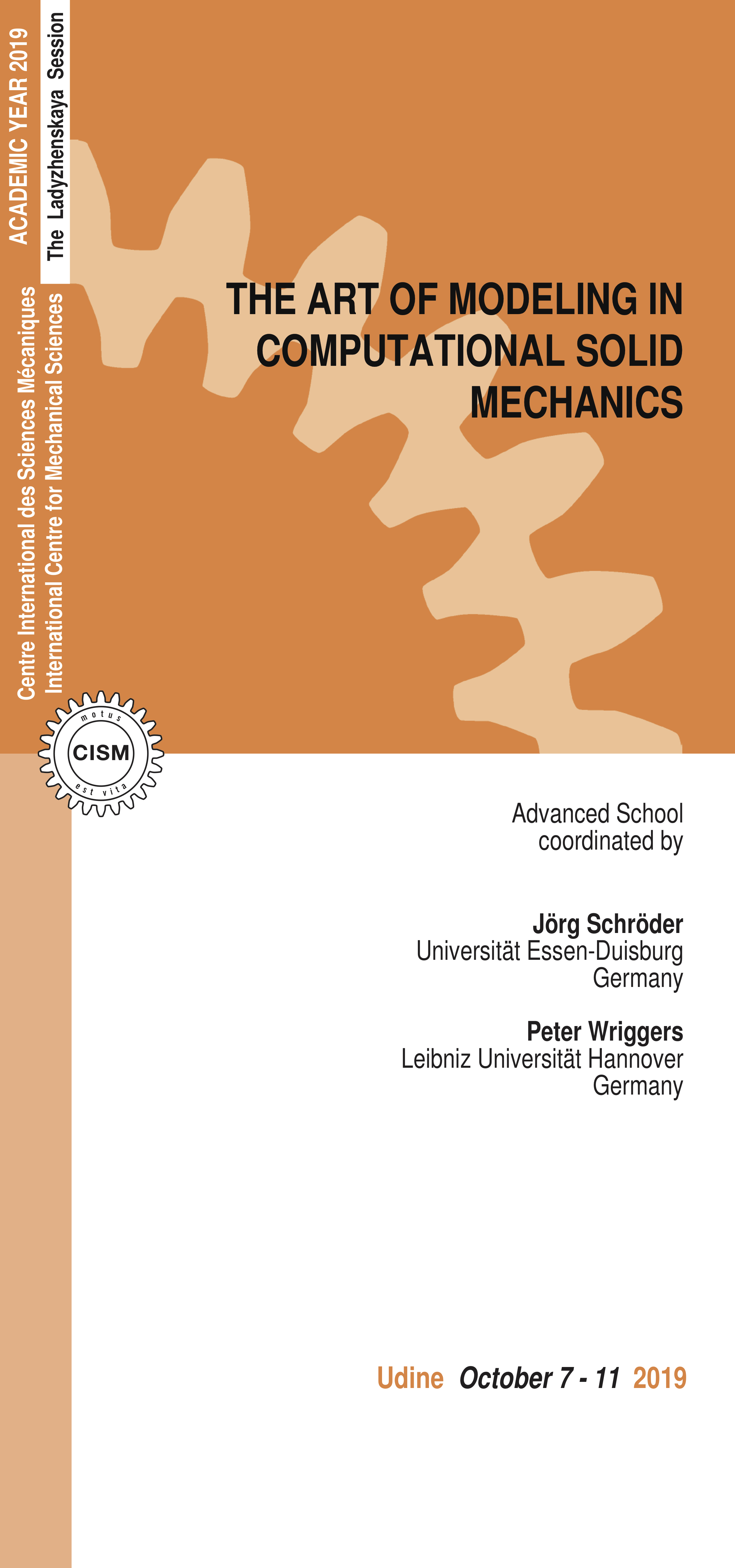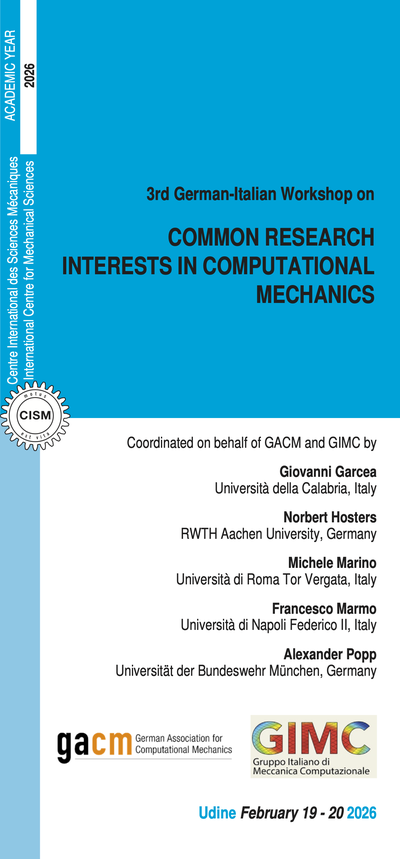Modeling is one of the main challenges in engineering science for the predictive description and simulation of the responses of systems and processes under complex actions in solid mechanics. This includes mechanical and mathematical modeling of single- and multi-phase materials as well as coupled problems, scale-bridging of micro-heterogenous materials, multiscale design of tailored materials, characterization of soft biological tissues and the tremendous development of data driven science in engineering using concepts of artificial intelligence, machine and manifold learning. All systems related to engineering need predictions of the behavior, durability and efficiency and hence models have to be developed that can be solved by analytical or numerical methods.
Therefore we focus on mechanical and mathematical modeling in single-phase solid mechanics, discussing theoretical models as well as simulation models associated with engineering applications in solid mechanics. Within the lectures examples will be considered in which different models and discretization schemes are compared.
Another challenging problem is the modeling and characterization of soft biological tissues. Some properties of a biological system, might be directly measurable, others, and especially in-vivo properties, can only be explored with proper models at hand. In addition, prospective events, i.e. questions such as ‘What would be the outcome from a certain clinical intervention?’ can only been explored through modeling. Soft biological tissues are non-man-made highly complex systems, and the first main task of the modeler is to decide what properties are important for the Intended Model Application.
A variety of engineering applications exhibit a coupling between individual thermodynamical fields, (e.g. thermoelasticity), electro-mechanical coupling, multiphase-systems. Hence in this course we discuss the general formulation of thermoelasticity and their solution using finite elements, the coordinate-invariant modeling of piezo-electricity within the framework of the invariant-theory and a macroscopic model of a saturated porous solids consisting of ice and water, presented within the theory of mixtures.
Computational homogenization schemes and multi-scale modeling can be seen as one of the driving forces in virtual material design. This field requires modeling and simulation at the scale of heterogeneous microstructures with an implicit or explicit connection to other scales. Particular emphasis is given to nonlinear and multiphysics phenomena at a micro-scale to incorporate related simulation challenges. We discuss numerical or virtual material testing across the scales to realize two-scale analyses equivalent to FE2 methods.
Modern advances in small-scale fabrication techniques have enabled the creation of a wide range of engineered meta-materials with tailored mechanical properties, whose design calls for theoretical and computational techniques that link microscale and nanoscale architectures to macroscale properties. We will discuss a number of state-of-the-art computational approaches and associated architected materials systems.
A tremendous development of Artificial Intelligence techniques took place in the last decades. Machine learning and manifold learning, and, notably, deep learning techniques, have assisted to an unprecedented growth in the wide range of applications they can be envisaged for. With the irruption of data-enabled science and engineering, applied science is today a symbiosis of theory, experiments and simulation. This lecture covers some of the most outstanding applications of AI and data-science in engineering sciences.
The course is intended for doctoral and postdoctoral researchers in civil and mechanical engineering, applied mathematics and physics as well as industrial researchers, who are interested in conducting research in the topic. A problem for young scientists trying to do high level research in this area is the number of topics one has to be familiar with: Advanced constitutive modeling, homogenization, data driven science in engineering as well as numerical discretization schemes and applications of these methods to coupled problems, biomechanics and tailored materials. Furthermore, there are neither adequate textbooks nor advanced courses at research/university level available. The aim of this CISM course is to fill this gap.
E. Comellas, T.C. Gasser, F.J. Bellomo, S. Oller. A homeostatic-driven turnover remodelling constitutive model for healing in soft tissues. Journal of The Royal Society Interface, 13: 20151081, 2016.
R. Ibanez, E. Abisset, J.V. Aguado, D. Gonzalez, E. Cueto, F. Chinesta. A manifold learning approach to data-driven computational elasticity and inelasticity. Arch Comput Method E, 25(1), 47-57, 2018.
D. M. Kochmann, K. Bertoldi. Exploiting microstructural instabilities in solids and structures: from metamaterials to structural transitions. Applied Mechanics Reviews, 69(5): 050801, 2017.
N. Kutz. Data-Driven Modeling & Scientific Computation, Oxford. University Press, 2013.
J. A. Lee, M. Verleysen. Nonlinear Dimensionality Reduction, Springer, 2007.
G. Martufi, T.C Gasser. Turnover of fibrillar collagen in soft biological tissue with application to the expansion of abdominal aortic aneurysms. Journal of The Royal Society Interface, 9(77): 3366–3377, 2012.
J. Schröder, D. Gross. Invariant formulation of the electro-mechanical enthalpy function of transversely isotropic piezoelectric materials. AAM, 73(8), 533-552, 2004.
K. Terada, N. Hirayama, K. Yamamoto, J. Kato, T. Kyoya, S. Matsubara, Y. Arakawa, Y. Ueno and N. Miyanaga. Applicability of micro-macro decoupling scheme to two-scale analysis of fiber-reinforced plastics. Advanced Composite Materials, 23, 421-450, 2014.
K. Terada, J. Kato, N. Hirayama, T. Inugai, K. Yamamoto. A method of two-scale analysis with micro-macro decoupling scheme: application to hyperelastic composite materials, Computational Mechanics, 52, 1199.1219, 2013.
P. Wriggers. Nonlinear Finite Elements. Springer, 2008. A. Zelhofer, D. M. Kochmann. On acoustic wave beaming in two-dimensional structural lattices, Int. J. Solids Struct., vol. 115-116, 248-268, 2017.
6 lectures on: artificial Intelligence and data driven science in engineering with special emphasis to data-mining, manifold learning and nonlinear dimensionality reduction, model learners and data-driven approaches, computational mechanics and engineering and engineered data (from big-data to smart-data) and multi-scale description of data.
6 lectures on: modeling and characterization of soft biological tissues. Introduction of basic principles of biomechanics with emphasis on modeling the properties of biological tissues. Intended Model Application ‘What bio-engineering question should be answered?’ guides all development steps, i.e. from the model requirement specification, framework section, software implementation, parameter calibration and model validation.
6 lectures on: tailored materials that perform through instabilities and careful multiscale design. State-of-the-art computational approaches and associated architected materials systems, including periodic and graded nano- and micro-truss lattices, optimized cellular solids and advanced composites, local and nonlocal as well as spectral homogenzation, Bloch wave analysis, and quasicontinuum modeling.
6 lectures on: mechanical and mathematical modeling of coupled problems. Thermoelasticity and the solution within the finite element framework, coordinate-invariant modeling of piezo-electricity within the framework of the invariant-theory and a macroscopic model of saturated porous solids consisting of ice and water, presented within the framework of the theory of mixtures.
6 lectures on: computational homogenization methods and modeling and simulation methods at the scale of heterogeneous microstructures with an implicit or explicit connection to another scale. Including nonlinear phenomena at micro-scale, numerical or virtual material testing across the scales, nonlinear heterogeneous materials coupled with multi-physics behavior (phase change, chemo-mechanics, nonlinear thermo-mechanics) and stochastic approaches.
5 lectures on: mechanical and mathematical modeling in single-phase solid mechanics. Basic nonlinear theory including fracture mechanics, advanced numerical simulation techniques based on the finite and virtual element method and related software development and comparison of different models and discretization schemes.
The registration fee is 600.00 Euro + VAT*, where applicable (bank charges are not included). The registration fee includes a complimentary bag, four fixed menu buffet lunches (on Friday upon request), hot beverages, downloadable lecture notes and wi-fi internet access.
Applicants must apply at least one month before the beginning of the course. Application forms should be sent on-line through the following web site: http://www.cism.it. A message of confirmation will be sent to accepted participants. Applicants requiring assistance with the registration should contact the secretariat at the following email address cism@cism.it.
Applicants may cancel their course registration and receive a full refund by notifying CISM Secretariat in writing (by email to cism@cism.it) no later than two weeks prior to the start of the course.
Cancellation requests received during the two weeks prior to the start of the course will be charged a 50.00 Euro handling fee. Incorrect payments are also subject to a 50.00 Euro handling fee.
A limited number of participants from universities and research centres who are not supported by their own institutions can be offered lodging and/or board, if available, in a reasonably priced hotel or student guest house.
Requests should be sent to CISM Secretariat by July 29, 2019 along with the applicant's curriculum and a letter of recommendation by the head of the department or a supervisor confirming that the institute cannot provide funding. Preference will be given to applicants from countries that sponsor CISM.
Information about travel and accommodation is available on the web site www.cism.it, or can be mailed upon request.
* Italian VAT is 22%.





